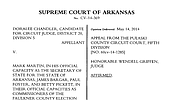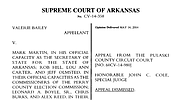The Arkansas Supreme Court on Wednesday upheld lower court rulings that three judicial candidates are eligible to run for office even though their law licenses had been temporarily suspended for nonpayment of bar dues.
The court said in three opinions that lawyer Angela Byrd, and sitting judges H.G. Foster and Tim Fox are eligible to run for office, and that their suspensions for overdue annual license fees did not violate a state constitutional requirement that candidates for circuit court judgeships hold a law license for six years before taking office.
Byrd and Foster are seeking separate seats in the 20th Judicial Circuit, which includes Faulkner, Searcy and Van Buren counties. Fox is seeking re-election to his seat in the 6th Judicial Circuit, which includes Pulaski and Perry counties.
Amendment 80 to the state constitution reads: "Circuit Judges shall have been licensed attorneys of this state for at least six years immediately preceding the date of assuming office."
In her majority opinion in the Fox case, Justice Josephine Linker Hart wrote that there is a distinction between a suspension and a disbarment.
"A 'suspension' for failure to pay the annual license fee limits the lawyer's privilege to engage in the practice of law. Contrasting the definitions of 'suspension' and 'disbarment,' a lawyer under suspension remains licensed, because that license has not been terminated and has not resulted in the removal of the lawyer's name from the list of licensed attorneys; it is only the lawyer's privilege to engage in the practice of law that is limited," she wrote.
Justice Donald Corbin wrote in his dissent, "Recently, this court was publicly accused of being results oriented. Never has that been more evident than with today's decisions."
Corbin dissented in the three cases, writing that he believed all three candidates should be ineligible for office under a strict definition of what it means to continuously hold a law license for six years. Hart dissented in part on the other two opinions, writing that she did not believe the court needed to address the issue of due process and that the rule for suspensions was not unconstitutional. Three justices did not participate in the decisions, and three special justices-- Raymond Abramson, Woody Bassett and Todd Turner -- were appointed to serve in their places.
Ken Gallant, a law professor at the University of Arkansas at Little Rock's Bowen School of Law, noted that the decision did not make a distinction between suspensions for administrative concerns and suspensions for ethical or legal misconduct.
"To me the most interesting thing is that the court treated suspension as essentially not losing your law licence," he said. If a lawyer is suspended, but "not disbarred for an ethical violation, then maybe that person still has the right to run for judge. It's only disbarment that really takes away your license and makes your period of licensure discontinuous."
Hart's opinion was cited in both the Foster and Byrd cases, written by Justice Cliff Hoofman and Chief Justice Jim Hannah respectively.
Hoofman also tackled the question raised by the judicial candidates of whether the practice under the court's rules to automatically suspend a law license when dues are not paid on time is constitutional. His opinion states that the specific rule within Amendment 80, which brought the administrative rules for the judicial branch under the jurisdiction of the office of the Supreme Court, was not constitutional because it did not allow for due process or account for situations when a check might be lost in the mail.
Bill Bristow, the attorney representing Clerk of the Supreme Court Leslie Steen, who was named as a third party in the lawsuits, said the process will be revised before license dues are collected in 2015.
"I certainly understand that portion. I'm sure there will be changes made to take care of that problem," he said. "There is a procedure in place to do something like that, and I'm sure it will be enacted."
Doralee Chandler, a lawyer who is running against Foster and who filed the lawsuit challenging his eligibility, said the portion of the opinions addressing Amendment 80 could have future implications.
"I have to respectfully disagree with the majority on this case. I do not think there is a constitutional violation of due process. [Your license] expires and you have to renew it. If you don't, then you are voluntarily giving it up," Chandler said. "I think this calls into question driver's licenses, and whether there is an issue there now because the renewal letters don't explicitly say your license will be suspended if you don't renew by a certain date."
The Supreme Court also dismissed an appeal Wednesday in a fourth case filed by Valerie Thompson Bailey, who was found ineligible by a lower court to run for judge in the 6th Judicial Circuit against Fox because of a nine-year suspension for failing to complete required educational training. The opinion written by Corbin said Bailey had waited too long to take action.
"The question of timeliness and, therefore, mootness arises because of Bailey's delay in pursuing the instant appeal," Corbin wrote. "Bailey could have availed herself of the provisions of Rule 6-1 and proceeded with an expedited appeal in this court. Likewise, she could have requested this court to enter a stay, of the circuit court's order thus allowing her name to appear on the ballot."
The Pulaski County Circuit Court ruling was issued on March 19, and Bailey filed a motion for reconsideration on April 2, more than a week after the March 21 deadline to approve the ballot.
Bailey's case was the first to be heard, and the ruling by a lower court removed her name from the ballot. The other lawsuits were heard after the ballots for the May 20 election were printed and those candidates would have remained on the ballot regardless of the court's decision.
Sam Perroni, a lawyer who represented Bailey and who also filed the lawsuit challenging Fox's eligibility, said he was disappointed in both opinions.
"I am deeply disturbed by what has happened. This is not fair to Valerie Bailey, nor is it fair to the people of Pulaski and Perry counties, who should have had a right to choose in that election," he said. "I've been in this business for 40 years, and I have never seen an appellate court shirk it's responsibility like it did in the Bailey case. It is borderline intellectually dishonest."
Perroni said he expected the court's decision in the case against Fox, saying he believed "the robe would protect the robe." But, he said he believed that would lead to the court also saying Bailey was eligible for office.
"I thought they were also going to have to say she was wrongfully removed," he said. "The case was not moot because the election has not taken place. Even if it had, there are things to be done to bring about a special election."
Jeff Rosenzweig, an attorney who represented Foster, said he was satisfied with the court's opinion in his client's case.
"We are gratified," he said. "And now the issue is up to the electorate of the three counties of the district as far as who they choose to be the judge."
A section on 05/15/2014




